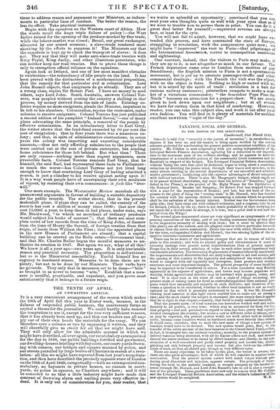TAXATION, LOCAL AND GENERAL.
TO TIIE EDITOR OF THE SPECTATOR.
Camberwell, 21st March 1849.
Sea—It is said that "necessity is the parent of invention": in numberless in- stances it has been so, and the maxim is being again verified by the several schemes projected for ameliorating the present politico-economical condition of the country. Mr. Cobden is seen cooperating with yet acting independently of the Liverpool Reform Finance Association, agitating for a reduction in our expendi- ture to the enormous sum of ten millions sterling; and he appears to have the countenance of a considerable portion of the community (both numerous and in- fluential) in support of his budget. The Liverpool Financial Reform Association, without fixing the sum that shall be deducted, hopes to bring about a maximum redaction by directing the public mind, through their tracts and speeches, to the many abuses existing in the several departments of our executive and adminis- trative government ; inculcating also the superior advantages of direct compared with indirect taxation. There is also Mr. Macgregor's budget, which ought not to be passed without observation, any more than the letters of' Emeritus," (pub- lished in the Times,) or the project of Mr. Rigby Wason for the liquidation of the National Debt. Besides the foregoing, Sir Robert Peel has stepped forward with a plan for the regeneration of Ireland; and last, but not least of the as- pirants to the glory of being the "coming man," is Mr. Disraeli, who has dazzled the country with his specious rhetoric announcing a scheme which he promises shall be the salvation of the landed interest. Neither has the Government been quite idle; they have crept out with reduced estimates, and a sixpenny rate in aid for Ireland, (which, by the by, there is not much probability of their carrying,)— not much for a Government to attempt, it is true, but a great deal is not now ex- pected from the Whigs !
The several plans enumerated above are very significant as symptomatic of the pressing necessities of the times, and of our leading statesmen being at last alive to the imperative necessity of dealing with them ; but it must be allowed they (the plans) are all too narrow, and are adapted more to relieve particular interests or classes than the entire community. Hence the ease with which Ministers have, for the time, extinguished Cobden and Disraeli, the two shining lights of the re- spective interests—commerce and agriculture.
There can be no doubt of the immense changes that are in course of taking place in this country; and with its altered policy and circumstances it mast of necessity undergo even greater social transformations than at present appear. Propel ties in their several relations of value to each other must experience very considerable alteration. The increasing displacement of manual labour by machinery, the improvements and discoveries that are daily being made in art and science, and the opening of this country to the ingenuity and enterprise of the whole civilized world to compete with our ingenuity and enterprise, must produce and develop enormous and most important changes. The present prosperity of some localities may be expected to be transferred to others. For a time commerce may flourish apparently at the expense of agriculture, and towns may become populous and wealthy, whilst agricultural districts may be hardened with paupers, crime, and want. It is clear that in the event of such a state of things occurring, the present mode of raising taxes for local as contradistingnisbed from national pur- poses would bear unequally and unjustly on such districts; and therefore it be- comes a question to be considered, whether in effect local taxation is not as rea117 national as that which is generally understood to be so. It was Mr. Disnielis viewing local taxation in that light which enabled him to make out ao strong a case; and the more closely the subject is examined, the more clearly does it appear that he is right in that respect,—naniely, that local is really national taxation. That the present syste.n of local taxation has heretofore worked well and satis- factorily to all parties, is very true: which may be accounted for from the fact that property—real and personal—in regard to area has been pretty well equally divided throughout the country; but under a new or different order of things, such as may be expected, the present system would not work either well or satisfac- torily, because some localities would be burdened much more heavily than others. It would seem, therefore, that to meet this new state of things a new system of taxation would have to be devised. The new system would point, first, to the transfer of the entire amount of the local taxation to the Consolidated Fund,—that, in fact, it be merged into our national taxation ; secondly, to the present system cd indirect taxation being abolished, with all its Exciao.otlices and staff, and instead thereof the entire revenue to be raised by direct taxation; and thirdly, to the con- struction of a well-considered and justly-rated property and income tax, distin- guishing not only between property and income, but also between the different kinds of each, so that all should pay, though at very different rates. There are many objections to be taken to this plan, the writer is aware; but there are also great advantages; both of which he will consider in another COM- munication. That the present system cannot hold much longer without pro- ducing great discontent and injustice, appears certain. The principle of trans- ferring the local to the national taxation, is already accepted by the landed in- terest through Mr. Disraeli, and Lord John Russell's rate in aid is also a recogni- tion of the principle. These gentlemen have now only to concur with Mr. Cobden and the Liverpool Financial Reform Association, and the writer's indication of the


























 Previous page
Previous page